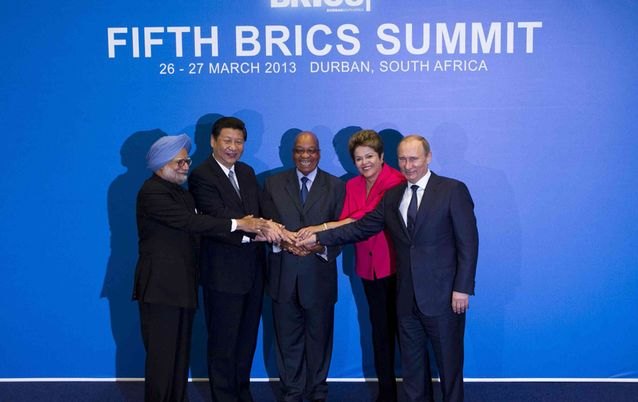We’ve been hearing about the effect it would have on world dominance when the US Dollar loses its status as “world reserve currency.” It looked, for a while, that the EURO might become another reserve currency. But now the BRICS nations are taking the initiative to create a new reserve currency to compete with the US Petro-Dollar.
The BRICS nations (Brazil, Russia, India, China and South Africa), together encompass over 25% of the world’s land coverage and 40% of the world’s population and hold a combined GDP of 20 trillion dollars. On almost every scale, they would be the largest entity on the global stage. These four countries are among the biggest and fastest growing emerging markets. Now they will have “their own special world bank.”
–ed.
——————————————————————————————————-
Bloomberg
Mar 26, 2013
BRICS Nations Plan New Bank to Bypass World Bank, IMF
 The leaders of the so-called BRICS nations — Brazil, Russia, India, China and South Africa — are set to approve the establishment of a new development bank.
The leaders of the so-called BRICS nations — Brazil, Russia, India, China and South Africa — are set to approve the establishment of a new development bank.
The biggest emerging markets are uniting to tackle under-development and currency volatility with plans to set up institutions that encroach on the roles of the World Bank and International Monetary Fund.
The leaders of the so-called BRICS nations — Brazil, Russia, India, China and South Africa — are set to approve the establishment of a new development bank during an annual summit that began today in the eastern South African city of Durban, officials from all five nations say. They will also discuss pooling foreign-currency reserves to ward off balance of payments or currency crises.
“The deepest rationale for the BRICS is almost certainly the creation of new Bretton Woods-type institutions that are inclined toward the developing world,” Martyn Davies, chief executive officer of Johannesburg-based Frontier Advisory, which provides research on emerging markets, said in a phone interview. “There’s a shift in power from the traditional to the emerging world. There is a lot of geo-political concern about this shift in the western world.”
The BRICS nations, which have combined foreign-currency reserves of $4.4 trillion and account for 43 percent of the world’s population, are seeking greater sway in global finance to match their rising economic power. They have called for an overhaul of management of the World Bank and IMF, which were created in Bretton Woods, New Hampshire, in 1944, and oppose the practice of their respective presidents being drawn from the U.S. and Europe.
Reform Needed
“We need to change the way business is conducted in the international financial institutions,” South African International Relations Minister Maite Nkoana-Mashabane said in a March 15 speech in Johannesburg. “They need to be reformed.”
The U.S. has failed to ratify a 2010 agreement to give more sway to emerging markets at the IMF, while it secured Jim Yong Kim, an American, as head of the World Bank last year over candidates from Nigeria and Colombia.
Finance ministers and central bank governors from the BRICS nations, who met in Durban today, agreed to set up currency crisis fund of about $100 billion, Brazilian Finance Minister Guido Mantega told reporters today. He didn’t give details of proposed funding for the new bank, which Brazil wants established by 2014. The nation’s leaders are due to sign a final accord tomorrow.
FDI Inflows
Goldman Sachs Asset Management Chairman Jim O’Neill coined the BRIC term in 2001 to describe the four emerging powers he estimated would equal the U.S. in joint economic output by 2020. Brazil, Russia, India and China held their first summit four years ago and invited South Africa to join their ranks in December 2010.
Trade within the group surged to $282 billion last year from $27 billion in 2002 and may reach $500 billion by 2015, according to data from Brazil’s government. Foreign direct invesment into BRICS nations reached $263 billion last year, accounting for 20 percent of global FDI flows, up from 6 percent in 2000, the United Nations Conference on Trade and Development said on its website yesterday.
“If they announce a BRICS bank it will be quite something,” O’Neill said in an e-mailed reply to questions on March 15. “At a minimum it symbolizes they can achieve something as political group and means lots of other things could follow in the future. It also means that they will have their own kind of special World Bank, which may aid infrastructure and trade projects.”
_____________________________________________________________________________
